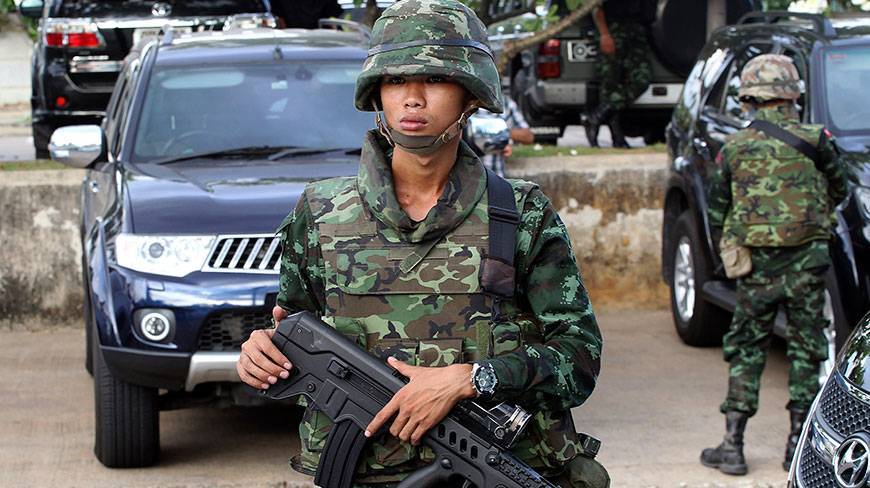Thailand’s military junta said yesterday it had disbanded the Senate and placed all law-making authority in the army chief’s hands, dramatically tightening its grip after a coup that has sparked Bangkok protests and drawn international condemnation.
The regime also confirmed it had detained former premier Yingluck Shinawatra and scores of other ousted government leaders and would hold them for up to a week as it corralled potential opponents to its takeover.
“The Senate is dismissed. Responsibility for any laws needing the approval of the parliament or Senate will instead be assumed by the leader of the (junta),” said an army bulletin on national television.
Thailand’s fragile democracy has been repeatedly stunted by 19 actual or attempted coups since 1932.
Analysts called yesterday’s developments an ominous sign that the junta led by the army chief, General Prayut Chan-O-Cha, could be digging in for a long-term, pervasive takeover, as it had earlier said the Senate would be retained.
Sporadic protests flared in Bangkok for a second straight day, with hundreds of demonstrators defying a ban on political gatherings to denounce the coup, echoing calls from Washington, the EU and elsewhere around the world for the restoration of civilian rule.
Prayut seized control Thursday after anti-government forces had waged a several-month campaign, marked by deadly Bangkok street protests, to oust Thailand’s civilian leaders.
Civil liberties have been curbed, media restrictions imposed, most of the constitution abrogated, and rival protesters from both sides of the political divide cleared from the capital.
Political analysts view the coup as part of a long-running effort by a Bangkok-based power elite – aligned with the monarchy and military – to eliminate the political dominance of Yingluck’s elder brother Thaksin Shinawatra.
Thaksin, a billionaire telecoms tycoon, shook up Thai politics by winning devotion among millions of rural poor with populist measures, catapulting him to prime minister in 2001 polls.
He was deposed in 2006 in a military coup, fleeing abroad two years later to avoid a corruption conviction, but his family and allies have continued his success at the ballot box.
The military said yesterday that Prayut had sent a letter regarding his takeover to the country’s revered king, Bhumibol Adulyadej.
The monarch, 86, commands great respect among his subjects, and his blessing is traditionally sought to legitimise Thailand’s recurring military takeovers.
The army said the king had “acknowledged” Prayut’s letter, but stopped short of describing the response as an endorsement. The palace has yet to issue a statement on the crisis.
Briefing the media for the first time since the coup, the military said Yingluck and other prominent figures had been taken in under a martial law provision allowing detentions of up to seven days without charge. It was not known whether any charges were being prepared, but military officials said the detainees were in no danger.
“(Yingluck) is under detention, and she is fine,” Lieutenant General Thirachai Nakwanich, head of the military command for central Thailand including Bangkok, told AFP. A military official told AFP she was being held at an unspecified army barracks in Bangkok.
A night-time curfew imposed by the junta has tamed the capital’s often rowdy tourist districts, further chilling a vital visitor industry already cooled by the long-term strife.
Tensions spiralled in early May when a court ruling controversially stripped Yingluck of office, setting the stage for the coup.
Meanwhile, the US is suspending $3.5 million in military aid to Thailand, its first punitive step against the country for the coup, the State Department announced Friday.
Spokeswoman Marie Harf said the department is still reviewing a further $7 million in direct US assistance to Thailand, and an undetermined amount of aid from other global and regional programs.
Source: Dhaka Tribune









